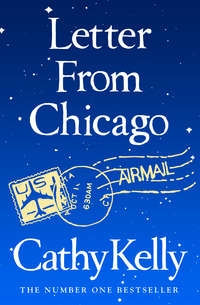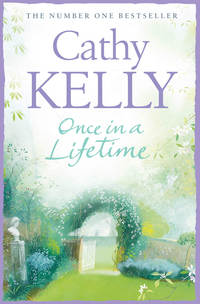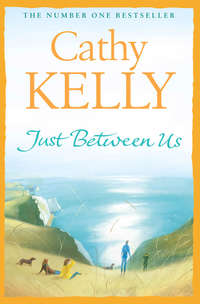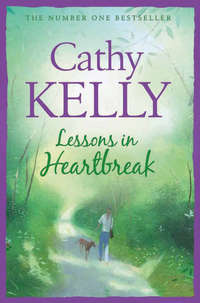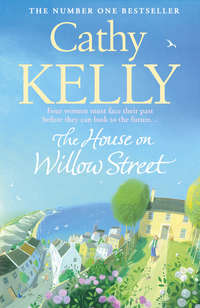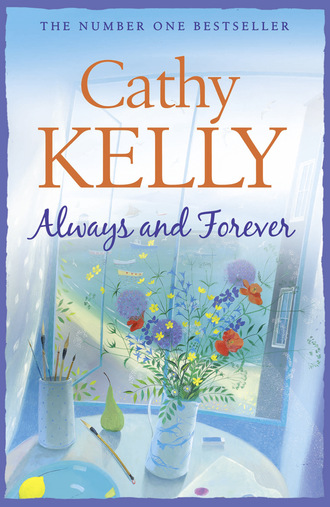
Полная версия
Always and Forever
Sondra, Barney’s wife, said that the family could always sell a bit of the land at the back of the hotel to developers, who’d whip up a couple of apartment blocks before you could whistle, and then, wouldn’t everyone be in clover?
Cleo was the only one to sound a note of warning. Fresh from graduating in the top five per cent of her class in hotel management, she said they really ought to think about refurbishing because times were tough and it would be very easy for a hotel like the Willow to slide into the doldrums because of a lack of vision on the family’s behalf. The big modern hotels were generally owned by corporations who could afford to invest with an eye to the long term, she said, while smaller establishments had to offer something special as boutique hotels, a concept that required high standards and lots of money spent.
Mrs O’Flaherty, who’d worked in the exquisite Victoria Jungfrau in Switzerland, had lectured Cleo’s class on the future of the hotel industry, and she’d been passionate about the need of smaller hotels to do their best to keep up.
‘If standards slip and the money isn’t spent, then your thriving small hotel can go from having every bed occupied to being empty every night very quickly,’ Mrs O’Flaherty had pointed out with great seriousness. ‘That is the tragedy of the family-owned end of the business. There often isn’t enough money for renovations but not investing is a recipe for disaster.’
The class, many of whom were from hotel-owning families, listened earnestly, making notes and wondering how they’d impart this information at home.
Cleo’s friend and admirer, Nat, who came from a quaint twenty-bedroomed hotel in Galway that had been in his family for generations, used to say he had no hope of getting through to his widowed mother about the need for investment.
‘She says there’s a limit to how much money you can spend on a place and that if we doll it up too much, we’ll have to charge miles more per room and all the old regulars won’t come near us,’ said Nat gloomily. ‘I keep telling her we need to put thousands into the place or we’ll go under, but she won’t listen. So what can I do?’
Cleo shrugged her shoulders, which meant: don’t ask me – you know my lot don’t listen to what I say either.
Cleo was the youngest in the family and, at the age of twenty-three, she was still treated like a child at home.
Barney and Jason had no interest in the hotel except to discuss its finances. When they’d reached twenty-five, each brother had been given a ten per cent share in the business. Cleo was sure that her father had waited until her brothers had reached twenty-five because they were both reckless when it came to money. Her mother insisted it was because Harry wanted to make sure they were sensible enough to think of the hotel’s future when they were finally part of the deal.
‘Twenty-five is ridiculous. It’s so far off it’s almost Victorian,’ Cleo insisted at her twenty-first birthday, when she heard of this scheme for the first time and realised she wasn’t old enough to be in it.
‘It’s the age of maturity,’ her father said.
‘In Jane Austen’s time, perhaps,’ Cleo said. She hated the fact that her father didn’t realise she was already far more mature than her brothers would ever be – honestly, they were like children sometimes – and she was determined to change this. Dad would listen to her. It was crazy not to give her her share now so she could have a say in the running of the business. She had all the training, she knew what would work and she was so eager…
‘Are you buying those magazines or are you practising to be in the wax museum?’ demanded the man behind the counter in the newsagent’s. Wrenching herself out of a daydream in which her family listened to her every utterance as if it was written on tablets of stone, Cleo realised she’d been staring blindly at the magazine rack for ages with two glossy magazines clutched to her chest.
‘Sorry,’ she said, going over to the counter and beaming at him. Cleo had a fabulous smile, everyone said, because it brought out her dimples and reached her eyes too. If Cleo had been the sort of girl who’d ever got into trouble – and she wasn’t, as she moaned to her best friend, Trish – she’d have been able to wriggle out of it instantly, thanks to her hundred-watt beam.
The newsagent’s face mellowed as he took the magazines to scan them. She was a grand girl and polite too, not like those hoydens who came in, flicked through every magazine in the place, read out the sex hints loudly, and went off without buying so much as a packet of crisps.
‘Thank you.’ Cleo took her change and her magazines, averting her eyes from the rows of chocolate at the till. Chocolate was evil, particularly the new white chocolate thing that just melted on your tongue and bypassed your stomach completely before resting on your backside. Cleo had never worried that much about her weight: she was tall with long legs and an athletic body. No matter what she ate, her stomach was enviably flat. Her breasts were the problem. A 38D was big in any language, and if she did put on any extra weight at least half went straight onto her chest.
Trish was waiting for her at the lights, huddled into her fake sheepskin coat because it was so cold, a knitted red hat flattened down on her head.
‘Whatdidya get?’ she demanded, poking at Cleo’s purchases as they waited to cross the busy city centre street.
‘Interior design magazines,’ said Cleo, hoping it wasn’t going to rain until she was on the bus home because she hadn’t got either a hat or an umbrella. Her hair was bad enough as it was, all wild and mind-of-its-own, but if it got wet – then she turned into cavewoman.
‘Why didn’t you get nice gossip mags to cheer us up?’ moaned Trish. ‘I love those pictures of stars with no make-up, spots, cellulite and fags in their hands.’
Trish had recently given up smoking and there was nothing she loved better than to see other people looking unhealthy with cigarettes in their hands. It proved, she said with gritted teeth as she chewed another bit of nicotine gum, that she’d made the right decision.
‘Because those mags are also full of diets and hints on how to look like J-Lo, and it always involves spending loads of money, which we don’t have, and being a size six, which we aren’t,’ Cleo pointed out.
The green man flashed on the pedestrian lights and they hurried across the road to the Shepherd, the pub where they’d spent many an hour when they were both in college in the city. Five minutes on the bus was all that separated the two colleges, and plenty of Cleo’s hotel management lecturers must have thought that Trish was enrolled there instead of on the business degree course across the River Liffey.
‘We could be size six if we wanted to,’ Trish said.
‘If we didn’t eat and had some of our important organs removed, then yes, it’s a distinct possibility.’ Cleo opened the swing door of the pub and felt the welcoming warmth of central heating on high.
‘Why are you so grumpy?’ demanded Trish, once they’d found a cosy nook and ordered two coffees.
‘I turned down the Donegal job.’
‘You didn’t!’
‘I did.’ Cleo almost couldn’t believe it herself. It wasn’t the job she’d longed for – just assistant manager at the small Kilbeggan Castle Hotel in a ruggedly beautiful part of Donegal – but it was her first real job. And she’d said no. She must have been mad.
The man who owned the Kilbeggan Castle clearly thought so too.
‘You were so keen and interested…’ he’d said in irritation when she’d phoned after getting the job offer in the post.
‘I am so sorry,’ Cleo said. ‘I didn’t mean to waste your time.’
‘Well, you did.’
‘Not intentionally,’ she interrupted. ‘It’s just something’s suddenly cropped up. You know I come from a hotel background? Well, there’s a good reason for me to stay at home and work with my family right now.’
‘I know tourism is down,’ the man said. ‘We’re all feeling the pinch because people are too nervous to fly any more. I suppose your place is hit the same way. Enough said.’ He sighed. ‘I suppose I’ll be reading your name in conjunction with all sorts of great ventures in the future. We were all very impressed with you, Miss Malin.’
‘Thank you,’ said Cleo with regret. Instinct told her Kilbeggan Castle would have been a lovely place to work. She was mad to turn it down. But in the end she just couldn’t bring herself to give up on her heritage. She had to try to drag the Willow and her family kicking and screaming into the new century before the hotel went under.
‘You’re mad,’ Trish said. ‘Stone mad. Sorry, I know that’s rude, but you are.’ She glared across the small pub table at Cleo, the way she’d been glaring at Cleo since that first day in Miss Minton’s class in Carrickwell Primary School, where they’d both decided they wanted to sit on the blue wooden chair and a fight had ensued with hair-pulling and lots of wild screaming.
Eighteen years later, there was no hair-pulling in the relationship, but occasionally there was a bit of screaming. Cleo had last roared at Trish when her friend shamefacedly admitted that she hadn’t actually dumped her current boyfriend as planned, even though he’d been seen in a clinch with another woman at a New Year’s party.
‘He says he’s sorry,’ Trish protested.
‘Until the next time,’ Cleo said angrily. ‘If he did that to me, he’d be on his way to casualty right now, whining for a morphine suppository to put him out of his misery.’ She meant it. Cleo mightn’t have had a long line of boyfriends but those she’d had had known not to mess her around. The guy who’d promised devotion after one evening, and that he’d phone but hadn’t, would always remember having his drink poured over his head in the pub the next day while Cleo loudly, and to the amusement of the whole premises, told him not to make promises he didn’t intend to keep.
‘Honesty is the best policy,’ she’d said as he sat with beer dripping down his astonished face. ‘If you didn’t want to see me again, all you had to do was say so. I’m not the sort of woman who likes waiting for the phone to ring.’
Today, Trish was the one trying to make her friend see sense.
‘Why did you turn it down? Why? It was a perfectly good job. What is the point of saying no to a good job in Donegal when your family takes no notice of you? Your dad’s not going to let you take over the place and show him how it should be done, is he? And neither are Barney or Jason. You said yourself Barney’s secretly hoping everything has to be closed down so you can sell the land and he and Sondra can make a fortune out of their share and live in the lap of luxury. You can’t save the Willow, Cleo, if they don’t want it saved.’
It was a perfectly good point and one Trish had been making for the past month, ever since Cleo had become acutely aware just how badly her family’s business was doing.
Terrorism meant tourism was down all around the world, but the Willow’s problem could not be laid solely at this door. The first inkling of doom had struck Cleo when she’d come home for Christmas, having spent the seven months since she’d left college working nights on reception in a big hotel in Bristol. She found shift work hard to get used to but felt she’d learned a lot – both about the business and about a handsome French guy named Laurent with whom she’d had a brief but fun fling. Now she wanted to show them all at home just how much she’d learned, although she didn’t plan on sharing Laurent’s native kissing techniques.
The Willow had only been half full for Christmas, the first time this had ever happened. Even an expensive advert in a national newspaper had failed to bring in guests. For the big Christmas Day lunch, they’d had to close off part of the dining room to take the barren look off the place.
Jason, Barney, her mother and her father all acted as if this was some blip on the radar, a chance happening. But Cleo knew that it wasn’t. It was the beginning of the decline. People wanted more from hotels than the faded grandeur they got in the Willow. They wanted silver tea services, elegant old furniture, the sense of gracious living that came from a beautiful old hotel – and hot water all day, a swimming pool and a beauty salon.
What could the much-loved Willow offer them?
‘Mind you, Donegal wouldn’t be hot enough,’ Trish went on thoughtfully. ‘If I were you, I’d get on the first plane out of here, go somewhere warm and gorgeous, and find a luxury hotel where I can come to stay and you can comp me a room. The Caribbean would be nice,’ she added, ‘sandy beaches, me on a lounger waving my hand in the air so some ebony god of a man with thighs like The Rock can smile at me and help move my sunshade.’ Trish sighed at the thought of it all.
‘Finished fantasising?’ enquired Cleo. She opened one of her magazines. ‘You see, this is my plan. If we did up the hotel ourselves, it wouldn’t cost so much.’ She found the page that had captivated her in the newsagent’s: a home not unlike the Willow in décor, but with lots of fabulous paint effects on the walls and an incredible trompe-l’œil arched door in a wall leading into a tropical garden. With something like that in their dining room, the hotel would look wonderful.
Trish sighed. ‘Cleo, those houses look like that because they have a fleet of paint experts each with a Masters in fine art working round the clock to transform a dingy hallway into a Garden of Eden with just seventeen tins of paint. If normal people like us do it, it would look like those paintings done by chimpanzees.’
‘It can’t be that hard,’ Cleo muttered.
Trish narrowed her eyes. ‘Yeah, right, Leonardo. Get real. Your family think you’re a kid who knows nothing. That’s what being the youngest is all about. You should face facts and get out of there and get on with your life. Like I have,’ she added defiantly.
Trish had moved to Dublin at the age of eighteen when she went to college. And she claimed that the secret to getting on with your family was not actually having to live with them. She’d lived away ever since. Cleo used to envy Trish for her independence in those days, but now she wasn’t so sure. She’d been wildly keen to go to Bristol and experience a bit of the world, and yet, when she did, she found that she missed home.
‘It was different for you, Trish,’ Cleo pointed out. ‘You needed to get out.’ Trish’s family were known for their volcanic arguments and door slamming. ‘But I don’t want to leave,’ Cleo said sadly. ‘I know if only I can make them see we’re in trouble, that they’ll do something, won’t they?’
‘OK, you have the family conference and tell them they’re doing it all wrong and let’s see what happens,’ Trish said. ‘And don’t say I didn’t warn you.’
As she walked to the bus, Cleo mulled it all over in her mind. She knew that staying in Carrickwell to revitalise her family business was unlikely to work for all the reasons Trish had mentioned: her father wouldn’t listen to her, and her brothers probably hoped it would fail anyway. Neither Jason nor Barney had shown the slightest inclination to work as hoteliers. Jason worked in the travel business while Barney was a sales manager in a local car dealership. If the hotel and its land were sold, they could make a lot of money.
Cleo loved her brothers but the age difference between them meant she’d been excluded from their games as a child, and even now there was always a squabble between them when they met.
The bus was waiting, and Cleo got on board. As the bus doors shuddered to a close, she took her scarf off and wriggled lower into her seat to enjoy the ride.
‘Cleo Malin, as I live and breathe. How are you?’
Mrs Irene Hanley, a friend of her mother’s, deposited two huge bags of shopping onto the seat beside Cleo. ‘Can I sit with you? I hate the journey home – drive you mad, wouldn’t it, with boredom?’ Without waiting for an answer, Mrs Hanley had removed her coat, rearranged her shopping on the floor so it fell onto Cleo’s feet, and launched herself into the seat. Built along the same lines as the robust women of Tonga, Mrs Hanley took up all her own seat and a fair percentage of Cleo’s too. Cleo was pushed nearer the window but all chance of staring happily out of it, in a world of her own, was now gone. Mrs Hanley was set for chat. First, she produced a box of chocolates from her shopping.
Cleo could feel hunger rising in her like a tidal wave as Mrs Hanley opened the box and dithered happily over her selection before choosing a succulent white chocolate and passing the whole box to Cleo.
‘Have a chocolate – ah, go on,’ she added, as Cleo shook her head. ‘One won’t hurt.’
Cursing herself for being so weak, Cleo took one. Chocolate caramel with a nut in the middle. She could feel the chocolate sensors in her body going on full alert. We’re back in business, boys!
‘Maybe I’ll have another one,’ she said.
Mrs Hanley’s family, all girls and all with the same statuesque physiques, were apparently either married or nearly married to wildly eligible men.
‘Now Loretta, her fellow, Lord, he’s fabulous, calls me his second mummy, well, he’s taking her to Lanzarote for Valentine’s Day. Loretta, I said, Loretta, hold on to that man, I said.’
‘Loretta, she was twenty-two last year?’ asked Cleo suddenly, remembering Loretta from the vast Hanley clan. Loretta had worked briefly in the Willow as a chambermaid one summer and now ran the Carrickwell office of one of the bus tour companies.
‘My baby.’ Mrs Hanley got all misty and only a dark chocolate nougat could make her feel better.
Cleo sighed and took a cappuccino cream. Since the shortlived thing with Laurent, there was no sign of a man in her life – except Nat, who didn’t count – never mind one with either the wit or the overdraft to take her to Lanzarote. How did Loretta do it?
Perhaps being less bolshie was the trick. Cleo knew she was tough with men, but you couldn’t change that, could you? A firm hand was what was needed, whether it was throwing drunks out of the hotel at closing time or telling men that one date did not entitle them to stare glassily at her cleavage.
‘Nearly there already. Lord, doesn’t the time fly when you’ve got company?’ Mrs Hanley said as the bus shuddered into the depot at the bottom of Mill Street. ‘As I said, I’m counting on Loretta coming back from Lanzarote with an engagement ring, although keep that to yourself, but if she does, we’ll have a bit of a bash. Nothing too fancy. They’ll be saving for the wedding, I dare say. Loretta loves the Metro-pole in Dublin. Very classy. Or the Merlin Castle and Spa over in Kildare. Pity we’ve nothing like that here. There are builders working all hours of the day and night on the health farm in the old Delaney place. It’s nearly finished, I believe, but it won’t have a hotel with it, so Loretta will have to go out of town if she wants her posh wedding.’
The words were only out of Mrs Hanley’s mouth when she realised what she’d said and clasped a beringed hand to her lips. ‘Sorry, Cleo. Me and my big mouth. I didn’t think. Don’t tell your mother, please. You know I’m mad about her, it’s just that young people, like Loretta, you know, they want different things at weddings these days and they like to make a weekend out of it. Say with the wedding on a Friday, then all sorts of treatments in the health centre on the Saturday, and a party that night. And you’d need a big ballroom too and at least fifty rooms to cater for all the people flying in from abroad. A small place with a few rooms wouldn’t do…’ She clamped a hand over her mouth again. ‘I’m digging an even bigger hole for myself, Cleo, love. I didn’t mean to offend you or your family.’
‘Don’t be silly, Mrs Hanley,’ said Cleo briskly. She could hardly blame the woman for pointing out the truth as Cleo saw it herself. ‘Anyway, you’ll be hearing interesting things about the Willow soon. We have great plans for the future, you know,’ she added. ‘The work will be starting soon, in fact.’
‘Be positive about your hotel,’ had been part of the advice in college. ‘Don’t be afraid to tell people the positive points and any future improvements, as long as you can back it up.’
And they’d be able to do that soon, Cleo reasoned. If her family listened to her.
‘I’m so glad,’ Mrs Hanley said. ‘I’ve been worried because the place has been a bit run down and your poor mother is worn out with it all. Myself and the girls from the book club talk about it all the time.’
‘You do?’
Relief that Cleo hadn’t taken offence made Mrs Hanley loquacious. ‘She looks worn out, you know. Worn out. It can’t be easy, although she keeps a brave face on her. But we have been worried, Cleo. I’m so fond of your mother, and your father too. I thought they might retire, to be honest, and head off for the sun. The heat’s great for arthritis and your mother is a martyr to it. Stay off the tomatoes, Sheila, I tell her, they’re ruinous for the old arthritis, but does she listen?’
Mrs Hanley pressed another chocolate upon Cleo before they parted company. ‘You’re only a slip of a thing,’ Mrs Hanley said disapprovingly.
Cleo grinned and took the chocolate. Compared to the Hanley girls, she was a slip of a thing.
As she walked out of the bus depot, she chewed her chocolate slowly to make it last and thought of the truth in Mrs Hanley’s words. Everybody could see that the hotel was in trouble. Except her family.
On her way up through Carrickwell to the Willow, Cleo passed The Holy Land, which looked a bit bare now Christmas had gone, and past the brightly painted façade of Little Tigers Nursery with its big tiger motif on the front door. It was half-six and parents were still rushing in to collect children, who emerged all wrapped up in warm clothes, running and skipping to their parents’ cars, talking madly about what they’d been painting and what games they’d played. Cleo had never given much thought to it before, but it occurred to her that it must be hard to leave your child in a nursery all day, only picking him or her up when you were both worn out.
Cleo and her brothers had never been sent to a crèche or nursery. The hotel had been their nursery. There had always been someone around to keep an eye on them, and from when she was little Cleo had loved helping clean bedrooms as long as she had her own yellow duster and her own squirty bottle. She wondered if she’d have children some day and would they play in the hotel while she worked, learning how to make a bed properly and watching the chef rustling up twenty-four cooked breakfasts as easily as making a cup of tea.
It had been a fun way to grow up. Her children would play in the hotel, she decided. She’d want them to enjoy their birthright the way she had. Of course, that was years and years off, and she’d need a man first. That wasn’t the sort of thing that could happen quickly. No way was she settling for any guy. She wanted the one. The right one. Perfect. Tall, naturally, so she wouldn’t have to look down on him. Small men loved her for some reason, but she could never bear to go out with anyone shorter than herself.
Laurent had been tall and olive-skinned, with the most amazing grey eyes. And his accent…when he said, ‘You are so sexy, Clee-oh,’ in that luscious Provençal drawl, Cleo had felt herself melt.
By the time she got home, Cleo’s hair was woolly from the damp of the evening. Hat – she had to buy a new hat to replace the one she’d lost on a night out with Trish. A vibrant young businesswoman needed decent hair. And she was a vibrant young businesswoman, the sort of one who could have her pick of handsome tall men with fabulous accents. Who’d manage to drag their eyes from her bosom to actual eye-level.
With this cheering thought in mind, she walked in the front door and did what Mrs O’Flaherty, her favourite course lecturer, used to tell the students to do: imagine they were guests arriving at the hotel and see what it felt like. Cleo stood and tried to see the hotel with a dispassionate eye.
The flowers that had only one day left in them yesterday still stood on the big hall table and it was obvious that nobody had got round to changing the water. Murky and green like water from a gloomy pond, it gave the hall the aroma of bad eggs. The cushions on the two big armchairs in front of the fireplace still bore the imprints of whoever had last sat in them, and a newspaper was rolled up and squashed in a corner of one. Worse still, the door to the conservatory hallway was swinging open, admitting both a stiff breeze from the garden and the smell of eau-de-cabbage from the kitchens.


